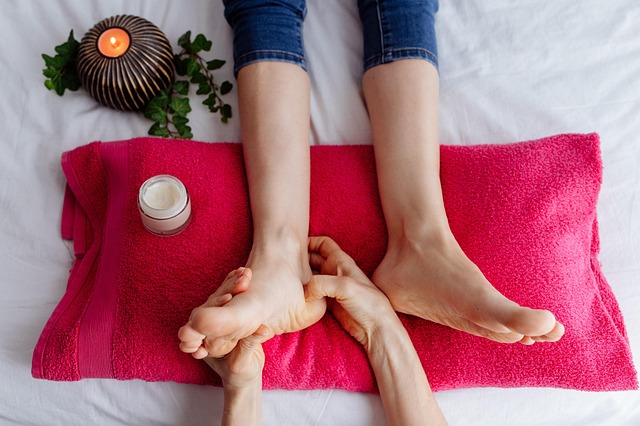Cold water therapy, particularly cold plunging or ice baths, releases endorphins to alleviate pain and reduce stress. This natural remedy has been shown to effectively lower cortisol levels, combat stress and anxiety, and promote mental clarity and relaxation, making it a promising alternative treatment for managing modern pressures. Regular cold exposure rewire's the body's stress response, offering significant benefits for overall well-being and tranquility.
Discover the powerful natural remedy of cold water immersion as a way to significantly boost your endorphin levels and enhance mental health. This article explores the science behind ‘cold plunging’ and its calming effects on stress and anxiety. We delve into how this simple therapy can be incorporated into daily routines, offering a refreshing approach to achieving tranquility and promoting overall well-being. Uncover the benefits of cold water for stress relief and learn why it’s gaining popularity as a game-changer in mental health care.
Understanding Endorphins and Their Role in Mental Health
Endorphins are natural chemicals produced by our bodies to regulate mood and promote feelings of well-being. Often referred to as “feel-good” hormones, they play a significant role in our mental health and overall stress response. These neurotransmitters are released during various physical activities, such as exercise or cold exposure, and help alleviate pain, reduce stress, and create a sense of euphoria.
When we immerse ourselves in cold water, whether through a cold plunge or short-duration cold showers, the body triggers a response similar to that of intense exercise. This stimulates the release of endorphins, which can have powerful calming effects on the mind. The benefits of this cold water therapy for mental health are well documented, with many people finding it an effective way to reduce stress and anxiety. By embracing the challenges of cold exposure, individuals can experience improved mood, heightened focus, and a profound sense of relaxation, making it an attractive natural remedy for those seeking alternatives to manage their mental health.
Cold Water Immersion: A Natural Way to Boost Endorphins
Cold water immersion, often in the form of a cold plunge or ice bath, has gained popularity as a natural way to boost endorphin levels and promote mental well-being. This simple yet powerful practice involves submerging oneself in cold water, typically below 59°F (15°C), for a short period. The sudden exposure to cold triggers a series of physiological responses in the body. One of the key benefits is the release of endorphins, often referred to as the ‘feel-good’ hormones, which act as natural painkillers and create a sense of calm and relaxation.
For individuals dealing with stress and anxiety, cold water therapy can be a game-changer. The calming effects of a cold plunge can reduce symptoms of anxiety by lowering cortisol levels and promoting a sense of tranquility. Regular immersion in cold water has been linked to improved mental health and an enhanced ability to cope with stressful situations. It provides a natural way to stimulate the body’s response to stress, thereby offering an alternative remedy for those seeking relief from daily pressures.
The Science Behind Cold Plunges and Stress Reduction
The science behind cold plunges and their ability to reduce stress and anxiety is a fascinating exploration of our body’s response to extreme temperatures. When you immerse yourself in cold water, whether it’s a quick dip or a prolonged cold plunge, your body initiates a series of physiological changes. One of the key benefits is the release of endorphins, often referred to as “feel-good” hormones, which are natural painkillers and mood elevators. This response is part of our body’s ancient survival mechanism, releasing endorphins to counteract the perceived cold stress.
The calming effects of a cold plunge extend beyond this hormonal response. Exposure to cold water can activate the parasympathetic nervous system, often referred to as the “rest and digest” system, which promotes relaxation and slows down heart rate and breathing. This activation helps counterbalance the continuous state of stress and anxiety that many modern individuals experience, offering a natural way to manage mental health and promote overall well-being.
Incorporating Cold Water Therapy into Your Routine for Calmness
Incorporating cold water therapy into your daily routine can be a powerful tool to combat stress and anxiety, offering a natural and effective method to enhance mental health. A cold plunge, or cold water immersion, provides an immediate sense of calm as the chill triggers a physiological response that can reduce levels of cortisol, often referred to as the ‘stress hormone’. This simple yet profound practice has gained popularity for its ability to provide instant relief from everyday worries.
The benefits extend beyond initial stress reduction; regular cold exposure can rewire your body’s response to stress over time. It encourages a sense of mental clarity and emotional resilience. Many advocates of cold water therapy attest to feeling more grounded, focused, and relaxed after a cold plunge. This ancient practice, now backed by modern science, is a simple way to cultivate a calmer mindset and improve overall well-being.
Cold water immersion offers a natural and effective way to boost endorphin levels, providing significant benefits for mental health. By incorporating regular cold plunges into your routine, you can experience reduced stress and anxiety while promoting overall calmness and well-being. The science behind this ancient practice demonstrates its ability to stimulate the release of endorphins, creating a sense of relaxation that goes beyond temporary relief. Embrace the calming effects of cold water therapy and unlock the potential for improved mental resilience and a quieter mind.
